#bartolomeo vanzetti
Text
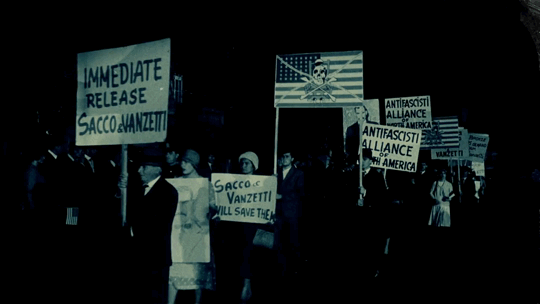
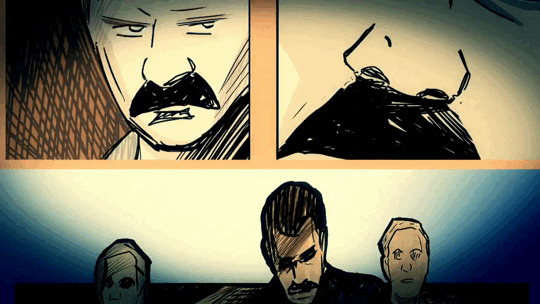


La Morte Legale (2018) Silvia Giulietti, Giotto Barbieri
#film#video#streaming#completemovie#mubi#documentary#la morte legale#silvia giulietti#giotto barbieri#sacco e vanzetti#giuliano montaldo#bartolomeo vanzetti#nicola sacco
29 notes
·
View notes
Text
Was just minding my business listening to assorted Wes Anderson soundtracks, now I’m crying bc of Joan Baez’s beautiful song for Sacco and Vanzetti:
Here’s to you, Nicola and Bart
Rest forever here in our hearts
The last and final moment is yours
That agony is your triumph.
For more on the tragedy of Nicola Sacco and Bartolomeo Vanzetti:
#joan baez#Sacco and Vanzetti#Nicola Sacco#Bartolomeo Vanzetti#here’s to you Nicola and Bart#weeping#communism#socialism#red scare#20th century#1920s#protest music#anarchist#Spotify
3 notes
·
View notes
Quote
Ho già detto che non soltanto non sono colpevole di questi due delitti, ma non ho mai commesso un delitto in vita mia non ho mai rubato, non ho mai ucciso, non ho mai versato una goccia di sangue, e ho lottato contro il delitto, ho lottato sacrificando anche me stesso per eliminare i delitti che la legge e la chiesa ammettono e santificano.
Questo è ciò che volevo dire. Non augurerei a un cane o a un serpente, alla più miserevole e sfortunata creatura della terra, ciò che ho avuto a soffrire per colpe che non ho commesso. Ma la mia convinzione è un'altra: che ho sofferto per colpe che ho effettivamente commesso. Sto soffrendo perché sono un anarchico, e in effetti io sono un anarchico; ho sofferto perché sono un italiano, e in effetti io sono un italiano; ho sofferto di più per la mia famiglia e per i miei cari che per me stesso; ma sono tanto convinto di essere nel giusto che se voi aveste il potere di ammazzarmi due volte, e per due volte io potessi rinascere, vivrei di nuovo per fare esattamente ciò che ho fatto finora.
Bartolomeo Vanzetti, ultima dichiarazione davanti ai giudici
11 notes
·
View notes
Text
De peperbus van nonkel Miele (61): Trump en fascisme
In november e.k. zijn er verkiezingen in de VS. Sommigen zien in de kansen van Donald Trump het gevaar van fascisme in de Verenigde Staten. Een bloedige dictatuur is misschien overdreven. Maar sommige fascistische ingrediënten zijn wel aanwezig in de VS. Tegelijk hebben de VS een ander gezicht: de sociale, ecologische en anti-raciale strijd. Ook is een socialistisch geïnspireerd senator en…

View On WordPress
#Angela Davis#bartolomeo vanzetti#Bernie Sanders#Celestino Medeiros#Donald Trump#Emmett Till#Fran Drescher#Gabriel Rockhill#George Floyd#Jesse Washington#Joe Biden#Joe McCarthy#Malcolm X#Martin Luther King#Nicola Sacco#Wernher Von Braun
1 note
·
View note
Text
Bunlar gelmese başıma, siz çıkmasaydınız karşıma
ona buna dert anlatacağım diye köşebaşlarında
harcar giderdim ömürümü,
silik, belirsiz, yenilmiş titretir giderdim kuyruğu.
Ama şimdi öyle mi ya!
Bizim başarımız bu ölüm, bizim zaferimiz bu.
Dünyada aklımıza gelmezdi böyle yararlı olacağımız,
insanlık için, adalet için hürlük için
eskaza gördüğümüz bu hizmeti
bir kere değil, on kere yaşasak yapamazdık.
Dediklerimiz, hayatımız, çektiklerimiz hiç kalır bunun yanında
hiç kalır yanında idamımız -bir kunduracıyla bir işportacı parçasının idamı
Yaşayacağımız o son anı elimizden alamazsınız ya!
O bizim işte, o bizim zaferimiz.
(Her boydan, Dost, 1957; Adam, 1985)
1 note
·
View note
Text
i love you italian characters that arent associated with the mafia i love you italian characters who arent gangsters i love you female italian characters who arent housewives i love you male italian characters who arent violent i love you italian characters with realistic accents
#did you know that in the early 2000s there were a couple polls conducted#and they found that 78% of teens and 74% of adults think the majority of italian americans are associated with organized crime#did you know that the actual stat for italian americans associated with organized crime is around 1 in 6000#did you know that hundreds of italian immigrants were arrested for organized crime association with no proof#did you know that teddy roosevelt said the lynching of 11 italian immigrants was “a rather good thing”#do you know who nicola sacco and bartolomeo vanzetti are#idk maybe im dramatic#but its really weird when the majority of peoples first thought when they think about italians is like 10 different mafia movies#or just i cooka da meatball#which is funny when its not the only thing said to you ever upon finding out youre italian#anyways thats just about italian-americans wait til yall hear about what other countries are on#italian
32 notes
·
View notes
Text
i know it's bad form to laugh at your own jokes but i do think it's really funny to imagine swedish-american labor activist Joe Hill, writer of songs such as There is Power in a Union or The Tramp, who was very famously killed in 1915, is actually still alive and just fucking around on tumblr.
#i mean he did say it takes more than guns to kill a man and that he never died#not worm#imagine you get a follow notification on tumblr and it was fucking Bartolomeo Vanzetti#semi obscure american hypercapitalist history
6 notes
·
View notes
Text
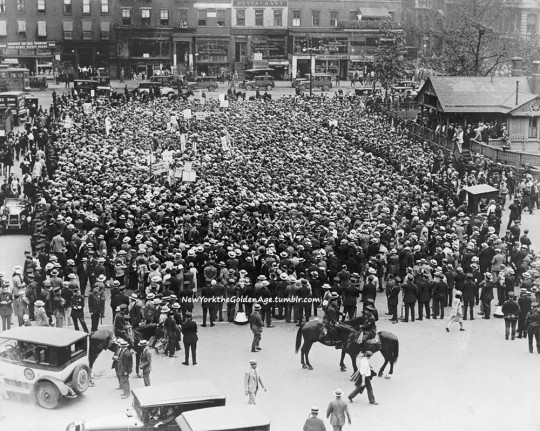
Nicola Sacco and Bartolomeo Vanzetti died in the electric chair on August 23, 1927. They were accused of killing two men during an armed robbery.
The trial and subsequent appeals attracted enormous interest internationally, and generated vehement protests. Sacco and Vanzetti were considered to be victims of prejudice against immigrants, Italians, Catholics, and anarchists. John Dos Passos, Dorothy Parker, Edna St. Vincent Millay, George Bernard Shaw, and Albert Einstein were among those who wrote about the case or signed petitions.
The photo above shows a demonstration in Union Square on the day of the men's execution.
Photo: Everett via Fine Art America
#vintage New York#1920s#Sacco & Vanzetti#protest#demonstration#cause celebre#August 23#23 August#23 Aug.#Aug. 23#Union Square#political protest#anarchism
176 notes
·
View notes
Text
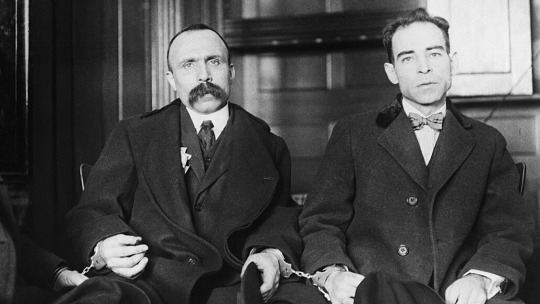
Today, it has been 96 years since the execution of the anarchists Nicola Sacco and Bartolomeo Vanzetti. Anti-immigrant bigotry played a significant part in determining the outcome of their trial. The court case became a rallying point for thousands around the world.
"Not only am I innocent of these two crimes, not only in all my life I have never stolen, never killed, never spilled blood, but I have struggled all my life, since I began to reason, to eliminate crime from the earth...
"I am suffering because I am a radical and indeed I am a radical; I have suffered because I was an Italian, and indeed I am an Italian; I have suffered more for my family and for my beloved than for myself; but I am so convinced to be right that you can only kill me once but if you could execute me two times, and if I could be reborn two other times, I would live again to do what I have done already."
-Bartolomeo Vanzetti, addressing the court at their sentencing
183 notes
·
View notes
Text
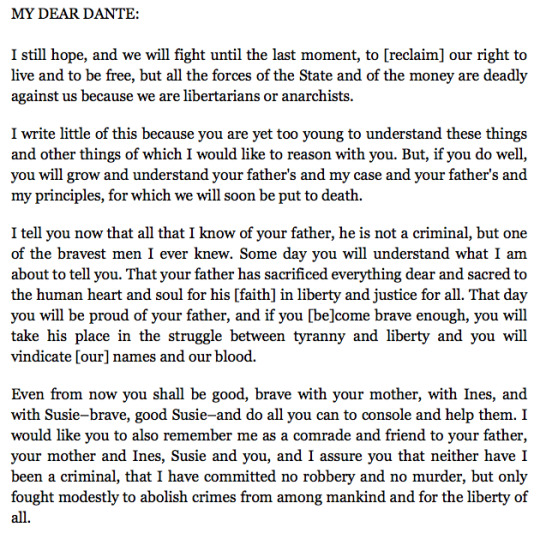
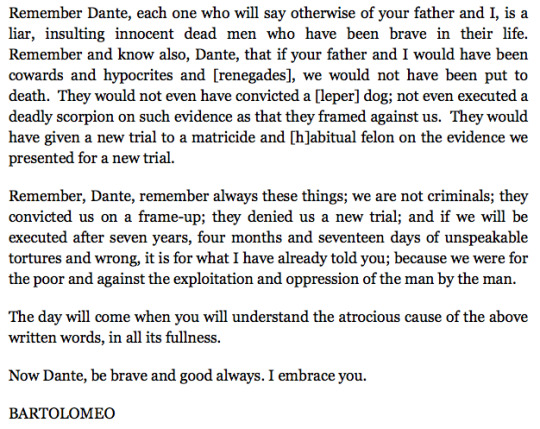
Bartolomeo Vanzetti's letter to Nicola Sacco's son, Dante. Written from the Death House of Massachusetts State Prison; August 21, 1927 – two days prior to Sacco and Vanzetti's execution by electric chair, on August 23, 1927.
(I.D. under the cut)
[MY DEAR DANTE:
I still hope, and we will fight until the last moment, to [reclaim] our right to live and to be free, but all the forces of the State and of the money are deadly against us because we are libertarians or anarchists.
I write little of this because you are yet too young to understand these things and other things of which I would like to reason with you. But, if you do well, you will grow and understand your father's and my case and your father's and my principles, for which we will soon be put to death.
I tell you now that all that I know of your father, he is not a criminal, but one of the bravest men I ever knew. Some day you will understand what I am about to tell you. That your father has sacrificed everything dear and sacred to the human heart and soul for his [faith] in liberty and justice for all. That day you will be proud of your father, and if you [be]come brave enough, you will take his place in the struggle between tyranny and liberty and you will vindicate [our] names and our blood.
Even from now you shall be good, brave with your mother, with Ines, and with Susie–brave, good Susie–and do all you can to console and help them. I would like you to also remember me as a comrade and friend to your father, your mother and Ines, Susie and you, and I assure you that neither have I been a criminal, that I have committed no robbery and no murder, but only fought modestly to abolish crimes from among mankind and for the liberty of all.
Remember Dante, each one who will say otherwise of your father and I, is a liar, insulting innocent dead men who have been brave in their life. Remember and know also, Dante, that if your father and I would have been cowards and hypocrites and [renegades], we would not have been put to death. They would not even have convicted a [leper] dog; not even executed a deadly scorpion on such evidence as that they framed against us. They would have given a new trial to a matricide and [h]abitual felon on the evidence we presented for a new trial.
Remember, Dante, remember always these things; we are not criminals; they convicted us on a frame-up; they denied us a new trial; and if we will be executed after seven years, four months and seventeen days of unspeakable tortures and wrong, it is for what I have already told you; because we were for the poor and against the exploitation and oppression of the man by the man.
The day will come when you will understand the atrocious cause of the above written words, in all its fullness.
Now Dante, be brave and good always. I embrace you.
BARTOLOMEO]
70 notes
·
View notes
Photo

Bartolomeo Vanzetti (June 11, 1888 – August 23, 1927)
Nicola Sacco (April 22, 1891 – August 23, 1927)
«Remember, Dante, remember always these things; we are not criminals; they convicted us on a frame-up; they denied us a new trial; and if we will be executed after seven years, four months and seventeen days of unspeakable tortures and wrong, it is for what I have already told you; because we were for the poor and against the exploitation and oppression of the man by the man.» – Bartolomeo Vanzetti, from The Letters of Sacco and Vanzetti, Edited by Marion Denman Frankfurter and Gardner Jackson, The Viking Press / The Vanguard Press, New York, 1928-1930, p. 323
(image: Bartolomeo Vanzetti (left) and Nicola Sacco (right). National Portrait Gallery, Smithsonian Institution, Washington, D.C.)
#graphic design#photography#book#bartolomeo vanzetti#nicola sacco#marion denman frankfurter#gardner jackson#viking press#the vanguard press#national portrait gallery#smithsonian institution#1880s#1890s#1920s#1930s
43 notes
·
View notes
Text
23 agosto 1927: Sacco e Vanzetti giustiziati da innocenti in America
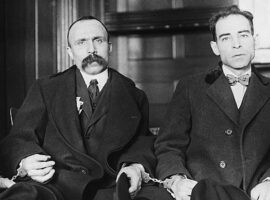
Il 23 agosto del 1927 Nicola Sacco e Bartolomeo Vanzetti furono fatti sedere sulla sedia elettrica e giustiziati per un duplice omicidio che non avevano commesso. I due italiani aderivano al movimento anarchico e sostenevano le battaglie operaie, solo dopo 50 anni fu ristabilita la verità
Il 23 agosto del 1927 la sedia elettrica poneva fine alle vite di questi emigrati italiani, un ciabattino e un pescivendolo, ingiustamente accusati di un duplice omicidio durante una rapina in un calzaturificio.
La loro tragica vicenda ha inizio nel 1920, durante una manifestazione operaia, i due venivano fermati in possesso di pistole e degli appunti. Sacco e Vanzetti per le loro idee anarchiche, il loro status di emigrati appartenenti al movimento operaio, erano i perfetti “agnelli sacrificali” da immolare sull’altare della giustizia americana del tempo.
Inoltre con il loro arresto veniva lanciato un monito ai movimenti popolari dell’epoca, considerati un pericolo per la stabilità degli U.S.A. A nulla valse la confessione del gangster Celestino Madeiros che scagionava Sacco e Vanzetti, così come non contribuì alla loro scarcerazione la mobilitazione popolare a loro favore. Con un processo fazioso (il giudice più volte li definì bastardi), portato avanti con metodologie gravemente erronee e ingiuste, il foggiano e il cuneese, venivano condannati alla pena capitale.
Solo nel 1977 il Governatore del Massachussetts, Michael Kukakis, ammetteva l’errore giudiziario commesso cinquantanni prima, quando venivano uccisi nella giornata d’estate del 23 Agosto del 1927 due innocenti: Nicola Sacco e Bartolomeo Vanzetti
84 notes
·
View notes
Text
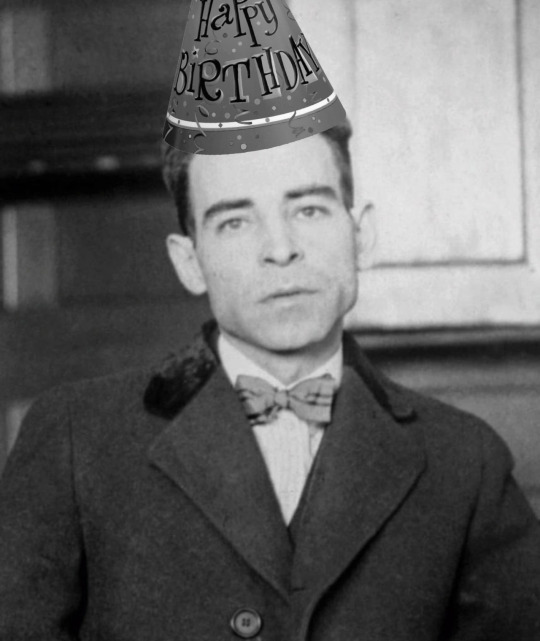
Happy birthday, Nicola Sacco! (April 22, 1891)
An Italian immigrant to the United States and an anarchist, Nicola Sacco, along with Bartolomeo Vanzetti, was accused in 1920 of the murder of Alessandro Berardelli and Frederick Parmenter during an alleged armed robbery. They were convicted in 1921, amidst a trial riddled with xenophobia and anti-anarchist bias. The pair became a progressive cause celebre, with many public figures lobbying for clemency and many protests being held. In the end, after the appeals process was exhausted, Sacco was executed along with Vanzetti by electric chair. It is today accepted that the pair was wrongfully tried, convicted, and executed, and in 1977 Massachusetts Governor Michael Dukakis issued a proclamation declaring so.
157 notes
·
View notes
Text

A.1.3 Why is anarchism also called libertarian socialism?
Many anarchists, seeing the negative nature of the definition of “anarchism,” have used other terms to emphasise the inherently positive and constructive aspect of their ideas. The most common terms used are “free socialism,” “free communism,” “libertarian socialism,” and “libertarian communism.” For anarchists, libertarian socialism, libertarian communism, and anarchism are virtually interchangeable. As Vanzetti put it:
“After all we are socialists as the social-democrats, the socialists, the communists, and the I.W.W. are all Socialists. The difference — the fundamental one — between us and all the other is that they are authoritarian while we are libertarian; they believe in a State or Government of their own; we believe in no State or Government.” [Nicola Sacco and Bartolomeo Vanzetti, The Letters of Sacco and Vanzetti, p. 274]
But is this correct? Considering definitions from the American Heritage Dictionary, we find:
LIBERTARIAN: one who believes in freedom of action and thought; one who believes in free will.
SOCIALISM: a social system in which the producers possess both political power and the means of producing and distributing goods.
Just taking those two first definitions and fusing them yields:
LIBERTARIAN SOCIALISM: a social system which believes in freedom of action and thought and free will, in which the producers possess both political power and the means of producing and distributing goods.
(Although we must add that our usual comments on the lack of political sophistication of dictionaries still holds. We only use these definitions to show that “libertarian” does not imply “free market” capitalism nor “socialism” state ownership. Other dictionaries, obviously, will have different definitions — particularly for socialism. Those wanting to debate dictionary definitions are free to pursue this unending and politically useless hobby but we will not).
However, due to the creation of the Libertarian Party in the USA, many people now consider the idea of “libertarian socialism” to be a contradiction in terms. Indeed, many “Libertarians” think anarchists are just attempting to associate the “anti-libertarian” ideas of “socialism” (as Libertarians conceive it) with Libertarian ideology in order to make those “socialist” ideas more “acceptable” — in other words, trying to steal the “libertarian” label from its rightful possessors.
Nothing could be further from the truth. Anarchists have been using the term “libertarian” to describe themselves and their ideas since the 1850’s. According to anarchist historian Max Nettlau, the revolutionary anarchist Joseph Dejacque published Le Libertaire, Journal du Mouvement Social in New York between 1858 and 1861 while the use of the term “libertarian communism” dates from November, 1880 when a French anarchist congress adopted it. [Max Nettlau, A Short History of Anarchism, p. 75 and p. 145] The use of the term “Libertarian” by anarchists became more popular from the 1890s onward after it was used in France in an attempt to get round anti-anarchist laws and to avoid the negative associations of the word “anarchy” in the popular mind (Sebastien Faure and Louise Michel published the paper Le Libertaire — The Libertarian — in France in 1895, for example). Since then, particularly outside America, it has always been associated with anarchist ideas and movements. Taking a more recent example, in the USA, anarchists organised “The Libertarian League” in July 1954, which had staunch anarcho-syndicalist principles and lasted until 1965. The US-based “Libertarian” Party, on the other hand has only existed since the early 1970’s, well over 100 years after anarchists first used the term to describe their political ideas (and 90 years after the expression “libertarian communism” was first adopted). It is that party, not the anarchists, who have “stolen” the word. Later, in Section B, we will discuss why the idea of a “libertarian” capitalism (as desired by the Libertarian Party) is a contradiction in terms.
As we will also explain in Section I, only a libertarian-socialist system of ownership can maximise individual freedom. Needless to say, state ownership — what is commonly called “socialism” — is, for anarchists, not socialism at all. In fact, as we will elaborate in Section H, state “socialism” is just a form of capitalism, with no socialist content whatever. As Rudolf Rocker noted, for anarchists, socialism is “not a simple question of a full belly, but a question of culture that would have to enlist the sense of personality and the free initiative of the individual; without freedom it would lead only to a dismal state capitalism which would sacrifice all individual thought and feeling to a fictitious collective interest.” [quoted by Colin Ward, “Introduction”, Rudolf Rocker, The London Years, p. 1]
Given the anarchist pedigree of the word “libertarian,” few anarchists are happy to see it stolen by an ideology which shares little with our ideas. In the United States, as Murray Bookchin noted, the “term ‘libertarian’ itself, to be sure, raises a problem, notably, the specious identification of an anti-authoritarian ideology with a straggling movement for ‘pure capitalism’ and ‘free trade.’ This movement never created the word: it appropriated it from the anarchist movement of the [nineteenth] century. And it should be recovered by those anti-authoritarians … who try to speak for dominated people as a whole, not for personal egotists who identify freedom with entrepreneurship and profit.” Thus anarchists in America should “restore in practice a tradition that has been denatured by” the free-market right. [The Modern Crisis, pp. 154–5] And as we do that, we will continue to call our ideas libertarian socialism.
#faq#anarchy faq#revolution#anarchism#daily posts#communism#anti capitalist#anti capitalism#late stage capitalism#organization#grassroots#grass roots#anarchists#libraries#leftism#social issues#economy#economics#climate change#climate crisis#climate#ecology#anarchy works#environmentalism#environment#solarpunk#anti colonialism#mutual aid#cops#police
33 notes
·
View notes
Text

Snake And Otacon Courtroom Sketch - Standing for Their Crimes
Joan Baez' "Here's to You" is a sensational track, and one that made Metal Gear Solid V Ground Zeroes introduction that much more impactful and salient. However, originally Kojima planned to use the piece in MGS 4, in a scenario where Solid (Old) Snake and Hal Emmerich (Otacon) are synonymous with persecuted, and executed, anarchists Nicola Sacco and Bartolomeo Vanzetti. Although still utilized in MGS 4's end credits, I do believe it loses its gravitas with the way the ending was changed (plus I prefer Joan Baez' original rendition).
Although I am happy with the ending we received, I wanted to pay homage to Kojima's original vision, which I do feel is more emotionally impactful, and true to how radical political actors are treated (Just look at Edward Snowden).
#metalgearsolid#MGS#fanartfriday#solidsnake#otacon#oldsnake#courtroom#digitalart#illustration#commissionsopen#hideokojima#herestoyou#fanart#cartoonart#anatomy#smoking#suits#trial
26 notes
·
View notes
Text

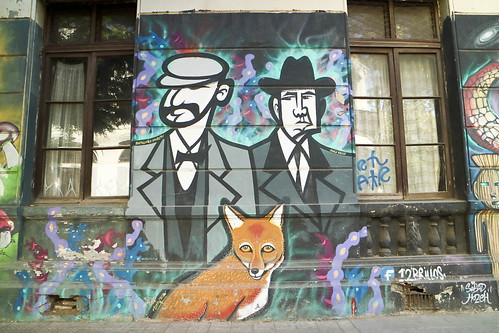
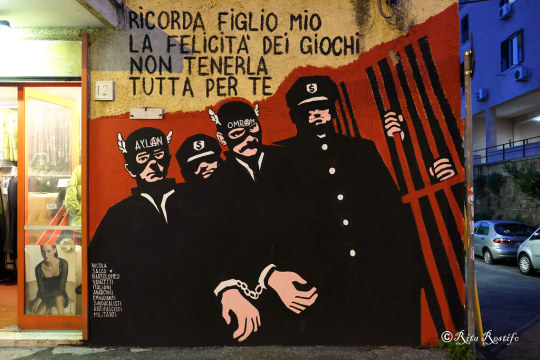

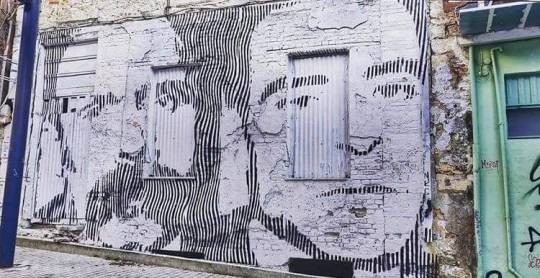
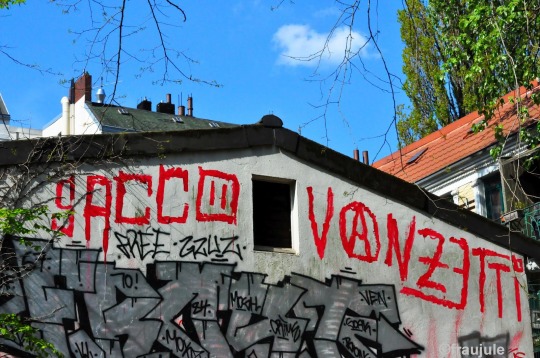

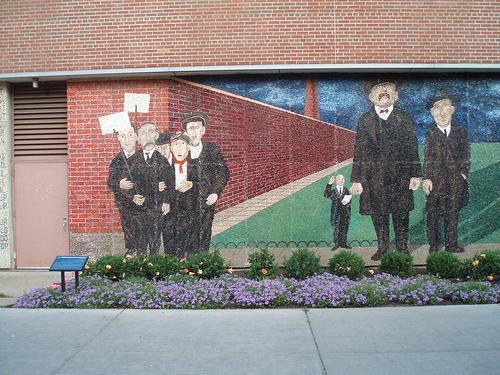


Memorial mural of Nicola Sacco & Bartolomeo Vanzetti, Italian-born anarchists who were executed on the 23rd of August, 1927.
Sacco and Vanzetti were falsely convicted of murder during a robbery they did not commit. Despite one of the largest solidarity campaigns in world history, the men were nonetheless executed simply for their conviction as anarchists.
Both men had made their way to America from Italy. Vanzetti worked as a fishmonger, Sacco was a skilled shoe-maker. Both were unionists, Sacco had been arrested for organising and participating in factory strikes. Despite his radical politics, Saccos boss believed he was such an upstanding man he trusted the anarchist with keys to the factory, and publicly defended the anarchist after his arrest.
The evidence of their innocence was overwhelming. Twelve of Vanzetti's customers testified that he was delivering fish to them at the time of the crime. An official at the Italian consulate in Boston testified that Sacco was there organising a passport at the time of the crime. On top of the facts, a man came forward and confessed to the murder. He was not arrested.
The jury had been hand picked from local members of the Masons and conservative organisations. Before the trial had even begun, the foreman of the Jury, Walter Ripley said “damn them! They ought to hang anyway.”
The judge, Webster Thayer, speaking of Vanzetti said “"This man, although he may not have actually committed the crime attributed to him, is nevertheless morally culpable, because he is the enemy of our existing institutions." A few days after the death sentence was handed down the judge gloated to a friend “"Did you see what I did to those anarchist bastards?"
The international solidarity campaign was incredible. In the UK, the campaign was led by philosopher Bertrand Russel. Even the former Prime Minister Ramsay McDonald expressed his disgust at the case. In the US, socialists and labour leaders like James Cannon and Eugene Debs were major figures in the campaign. Even the conservative AFL-CIO, the major trade union body in the United States supported Sacco and Vanzetti. Hundreds of thousands of workers attended public meetings to hear about the case. Often these were broken up by police, and hundreds more workers ended up in jail just for supporting the campaign. In Argentina direct actions by anarchists were undertaken against the US embassy, and the anarcho-syndicalist FORA organised large demonstrations in support of the anarchists. Despite all the public pressure, tragically appeal after appeal was rejected. Finally on 23rd of August, 1927 the anarchists were executed by the electric chair.
After the anarchists met their deaths there was an explosion of outrage across the world. The US embassy in Paris was surrounded by tanks to protect it from an angry crowd of protestors. A riot in London resulted in 40 injuries, the US Consulate in Geneva was surrounded by a 5,000 strong crowd, while huge crowds wearing black armbands marched in Boston and New York.
The brave pair met their deaths with honour. They were aware that the struggle for their freedom had inspired hundreds of thousands around the world. As Vanzetti said “If it had not been for these things… i might have died unmarked, unknown a failure. Now, we are not a failure… This is our triumph. Never in our full lives could we hope to do such work for tolerance, for justice, for man's understanding of man as we now do by accident. Our words - our lives - our pains, nothing! The taking of our lives - the lives of a good shoemaker and a poor fish-peddler - All! That last moment belongs to us.
That agony is our triumph!”
284 notes
·
View notes